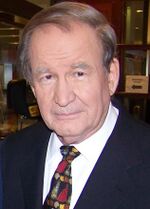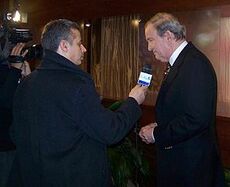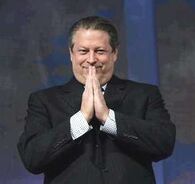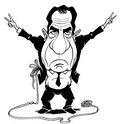Pat Buchanan
Patrick Joseph "Pat" Buchanan (born November 2, 1938) is an American paleoconservative political commentator. Buchanan offered advice to Presidents Nixon, Ford, and Reagan, though thereafter he cut out the middle-man and wrote columns directly to the voters. He is probably willing to offer advice to Donald Trump.
Paleoconservatism[edit]
Buchanan is described as a paleoconservative, as opposed to neo-conservative. Paleoconservatives are presumably old, and neo-conservatives are by definition new. Buchanan is undeniably old.
People described as neo-conservatives are in favor of involving America in nuclear war in order to defend Israel. Paleoconservatives want to have nothing to do with the rest of the world, and especially Israel. They argue that free trade exposes Americans to swarthy foreigners who refuse to wear baseball caps, languages with lots of raspy sounds, and the risk of importing diseases such as cooties.
It is inaccurate to refer to Buchanan as xenophobic, because he does vacation in Switzerland, though he is careful not to let any Jews return to America in his luggage.
Jews?[edit]
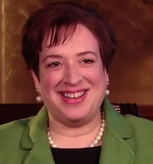
Buchanan has a long history of writing things about the Holocaust which, if one were contributing to a prominent other wiki, one could portray as irrefutable evidence of racism. Buchanan denies this charge, but why would one take the word of an anti-Semite?
Buchanan began this disturbing trend by writing that it was impossible for 850,000 Jews to be killed at the gas chamber at Treblinka. For one thing, he wrote, once you get that many Jews together, there is so much kvetching that someone would have heard it. Conservatives like William F. Buckley wrote columns taking Buchanan to task, as the nation was not in the middle of a Republican primary and there were therefore no politicians for them to take to task, nor even useful tasks to take to task.
The Anti-Defamation League has kvetched that Buchanan is an "unrepentant bigot" — remarks that have not induced Buchanan to repent, which proves the major point. George Will confronted him once on television and he avoided the argument entirely (thanks to a fortuitous commercial break), which virtually proves it. However, having survived that dust-up, Buchanan went on to note how over-represented Jews are in the Congress, so much so that they have their own "Amen corner" in the Rotunda — though in fairness, Muslims now have prayer rooms in each chamber, and can do ritual foot-washing in the well of the House.
In his own defense, Buchanan states that "I talk to Jews all the time," while not naming anyone.
Buchanan has been accused of associating with numerous white supremacists. These include a cab driver and the kid who used to deliver papers to his residence.
Political career[edit]
1992 campaign[edit]
Buchanan launched his political career in 1992, apparently piqued that George H.W. Bush had broken that "Read my lips!" promise thing and willing to run against his own party's President. Buchanan opposed abortion and gay rights and won 38% in crucial though unpopulated New Hampshire, scaring Bush enough that he announced a freeze in new federal rule-making that would last the full 90 days it would take to let him nail down the nomination. Buchanan went on to win 3 million votes nationwide, which sounds impressive, but in fact is merely enough to win an invitation to the Convention to watch it nominate someone else. Buchanan gave a speech at that convention, which was widely criticized as making Vice President Dan Quayle look uninspiring. Republicans never forgave Buchanan for not letting Quayle look uninspiring on his own.
1996 campaign[edit]
Buchanan returned to an illustrious career in talk radio, going back and forth with left-wing lawyers on the Crossfire program. But the Presidency beckoned. Not only was Democrat Bill Clinton the President, Bush made it clear he did not want a rematch. This meant it was open season for Republicans, even those like Buchanan with clear positions on the issues. The only front-runner was Bob Dole, who was thought to have many weaknesses, though it would take an entire campaign before it would become certain that he had many weaknesses.
Immediately, claims of association with white supremacists began to surface, even though the campaign denied them, though ditching staff just to remove all doubt. Buchanan used soaring rhetoric against what he saw as a bland establishment. Unfortunately, Dole played the blandness card and won the Republican numbers game on Super Tuesday. Buchanan briefly threatened a third-party candidacy, but Dole picked Jack Kemp for Vice President off the practice squad of the Buffalo Bills. Buchanan saw that America would have lots of abortions, but would not lose American football, and endorsed the ticket. He returned to talk radio and wrote books to flog his grudges.
2000 campaign[edit]
None of that sold, however, especially when everyone on the talk show agreed that the nation should not have gone back into Iraq. Fox News called itself "Fair and Balanced" but revealed itself as firmly biased toward attracting at least a thousand viewers, which unanimity on the set was not doing.
Buchanan's only viable option was a clean break with the Republican Party. In 1999, he did so and sought the nomination of Ross Perot's Reform Party. Perot had championed running America like a business and quitting the campaign on a whim from time to time, whereas Buchanan championed running America like a Nazi camp. Buchanan's Reform opponent was John Hagelin of Transcendental Meditation fame, who vowed to pay down the national debt with contributions raised by passing out sticks of incense at airports. Ultimately, their campaigns split the Party in two as neatly as big-time wrestling federations, with two nominating conventions and two Presidential tickets, which is always dicey when one goes from state to state to persuade their Secretaries of State to put you on the ballot but the other guy got there first. However, the federal government ruled that Buchanan was the real Reform candidate and was entitled to federal matching campaign funds, so Hagelin had to call himself something else.
Buchanan won an impressive 0.4% of the national vote, but won a vital footnote in the election — small enough to fit on a tombstone, but large enough to finally make headlines. After studying the electoral vote totals, several voters came forward to claim it was preposterous that 3,407 voters in very Jewish Palm Beach, Florida would have voted for Buchanan. These voters, accompanied by K Street lawyers, said the county's ballot, with more folds than an MS-DOS Reference Card, had tricked them into voting for Buchanan and they would never again be able to show their faces at Temple. They were all certain they had voted wrong, even though their evidence was lost forever inside the ballot box. The lawyers quickly told their client, Al Gore, that Florida was rightfully his, and the nation was plunged into a month of chaos, though ultimately spared four years of it.
Never mind[edit]
Buchanan attended one more Reform Party convention, but afterward wrote the obligatory speech to explain why immutable bedrock principles meant he was really a Republican once again. However, he vowed never to run for office again, as the Party was now firmly neo and not at all paleo.
Sixteen years later, Donald Trump would campaign for the Presidency, once again vowing to hermetically seal America's borders, end the scourge of free trade, and Put America First Make America Great Again. And he was promptly linked to white supremacy movements, making racist slurs such as "work," and being incapable of seeing things from the side of the little guy. The difference was that neo Trump, who was 69, was willing to use Twitter at 3:00 a.m. and discuss the size of his penis during campaign debates, while paleo Buchanan, then 78, conserved his energy, secure in the knowledge that the campaign would be futile because no one has Republican values anymore; heck, give it ten more years and the Electoral College itself will be all-Mexican.
See also[edit]
| ||||||||||||||||||||
